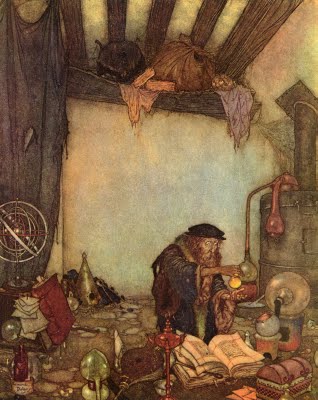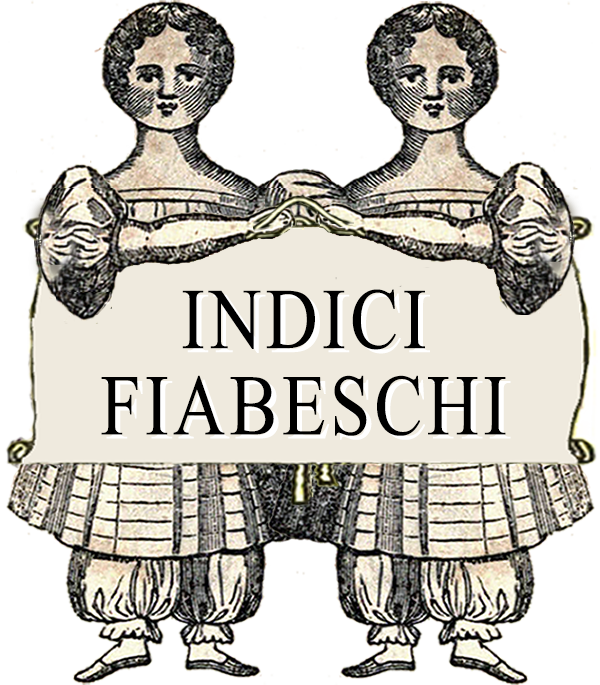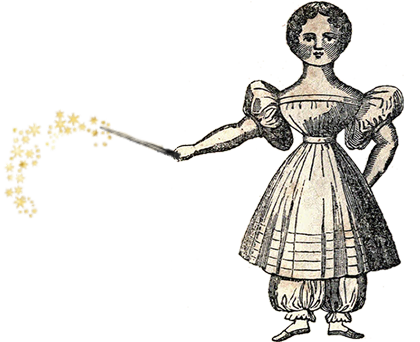| Viveva centinaia di
anni fa, nella lontana città di Pietramala, un
uomo chiamato Mastro Gergerio, che era espertissimo
in due arti. Di giorno esercitava l'arte della
sartoria, tanto bene che andavano a farsi cucire gli
abiti da lui i nobili e i migliori mercanti della
città, di notte praticava in segreto la magia
e la negromanzia. Mastro Gergerio aveva preso come
apprendista il figlio di un povero contadino, un
giovane di nome Lionetto, sveglio,
volonteroso, pronto a imparare tutto ciò che padrone
gli insegnava. Ma una volta Lionetto si svegliò nel cuore della notte, e avendo qualche sospetto si alzò e senza far rumore andò a guardare da una fessura cosa faceva il suo padrone: rimase tanto affascinato da quello che vide che anche la notte seguente fece finta di dormire, per poi alzarsi e stare a guardare gli esperimenti magici. Così prese a scrutare ogni notte nella stanza segreta di Mastro Gergerio, perché gli piaceva di più l'arte della magia che l'arte della sartoria. Di giorno però Lionetto non imparava più nulla, e da accorto e preciso era diventato pigro e trasandato, tanto che Mastro Gergerio finì col riportarlo da suo padre. Il pover'uomo si disperò e dopo poco riportò Lionetto da Mastro Gergerio, supplicando perché lo riprendesse come garzone, gli insegnasse la sartoria, e lo punisse se non si comportava bene. Allora il mago lo riprese, ma Lionetto dava ancora meno l'impressione di imparare, non teneva nemmeno gli occhi aperti, così il mago lo prendeva a pugni e calci tutti i giorni, picchiandolo tanto che spesso lo faceva sanguinare. Ma Lionetto sopportava, e ogni notte da quella fessura guardava nella stanza segreta gli esperimenti del suo padrone. A un certo punto Mastro Gergerio, convinto che il suo apprendista aveva il cervello bacato senza rimedio, non si curò più di nascondergli gli strumenti della negromanzia, pensando che chi non riusciva a imparare il mestiere di sarto, tanto meno avrebbe potuto imparare la magia nera, che era assai più difficile. Lionetto si mostrava tonto, ma era assai rapido nell'imparare l'arte segreta, tanto che dopo un po' di tempo aveva superato il suo maestro. Un giorno che il padre di Lionetto venne a vedere a che punto era nel mestiere di sarto il suo figliolo, lo vide che anziché cucire portava l'acqua e la legna per la cucina, spazzava, faceva i servizi più umili, e ci rimase male, così lo riportò a casa. Il contadino aveva speso molti soldi per mandare Lionetto in città, e rammaricandosi perché non aveva imparato l'arte della sartoria gli disse: "Figlio mio, tu sai quanti sacrifici ho fatto perché tu diventassi sarto, e ora non mi ritrovo nemmeno un soldoda parte e non so come fare per andare avanti". "Padre mio," rispose Lionetto, "prima di tutto voglio ringraziarti per tutto quello che hai fatto per me, poi voglio che non ti preoccupi per il futuro anche se non ho imparato l'arte del sarto come desideravi, perché ne ho imparata un'altra che potrà servirci molto più di quella. Stai tranquillo, caro babbo, e vedrai che non è stato inutile mantenermi in città, e che presto questa casa non conoscerà più la miseria. Ora con l'arte negromantica mi trasformerò in un cavallo, e tu mi porterai alla fiera con sella e briglie, e mi venderai: ma sta ben attento a non dare a nessun costo le briglie al compratore, perché altrimenti non potrei tornare a casa e forse non mi vedresti mai più". Così dicendo Lionetto si trasformò in un bellissimo cavallo e suo padre lo portò alla fiera, dove tutti lo guardavano ammirati per la sua bellezza e per le straordinarie prove di agilità. Ma passò di là anche Mastro Gergerio, che si accorse che il cavallo nero era magico; così tornò a casa, si trasformò in mercante e dopo aver preso molti denari tornò alla fiera. Guardando il cavallo da vicino riconobbe il suo vecchio apprendista e chiese al contadino se voleva venderglielo. Quello disse di sì, e si accordarono per una somma di duecento monete d'oro, senza le briglie, ma il mago insistette tanto, e offrì al contadino altre monete d'oro, tante che lo convinse. Così il mago prese il cavallo per le briglie e lo portò nella sua stalla, somministrandogli subito una violenta scarica di bastonate. Lo bastonava a sangue tutte le mattine e tutte le sere, tanto che il cavallo era ridotto in uno stato da far pietà. Mastro Gergerio aveva due figlie che vedendo il loro padre così crudele ebbero compassione del povero animale, e ogni giorno andavano nella stalla e gli facevano tante carezze. Una volta poi lo presero per la cavezza e lo portarono al fiume per dargli da bere, ma appena il cavallo fu vicino all'acqua si trasformò in un pesce tonno e si tuffò nelle onde. Le figlie del mago si spaventarono e tornarono a casa piangendo a dirotto. Quando il mago tornò andò subito nella stalla per bastonare come ogni sera il cavallo, e non trovandolo si infuriò, ma entrato in casa vide le sue figlie tutte disperate, e disse: "Non abbiate paura, raccontatemi cosa è successo col cavallo e cercherò un rimedio". Appena le figlie gli ebbero detto che il cavallo si era trasformato in un pesce tonno, il mago corse in riva al fiume e tuffandosi si trasformò in un pesce squalo che cominciò a rincorrere il tonno per divorarlo. Il pesce tonno nuotava veloce ma lo squalo gli era sempre dietro, cercava di nascondersi tra le canne e nelle grotte acquatiche, ma lo squalo riusciva sempre a trovarlo. A un certo punto il tonno, avendo paura di essere divorato, si avvicinò alla sponda e trasformandosi in un preziosissimo rubino saltò fuori dall'acqua e si lasciò cadere nel cestino di una damigella, che raccoglieva le più belle pietruzze di fiume per donarle alla figlia del re. La principessa, che si chiamava Lucilla, quando vide il prezioso rubino rimase estasiata, lo fece incastonare in un anello d'oro e se lo mise al dito. Il rubino le piaceva tanto che lo tenne al dito anche quando andò a letto. Nel cuore della notte Lionetto riprese la sua forma umana e vedendo la bellissima fanciulla addormentata l'accarezzò. Lucilla si spaventò e voleva urlare, ma lui le mise una mano sulla bocca, poi si inginocchiò e la supplicò di aiutarlo. "Non credere, mia bella principessa," disse, "che io sia venuto qui per farti del male o per rapirti, sappi che la mia vita è in pericolo a causa di un maledetto mago negromante, e che ora tu puoi perdermi o salvarmi. Ti prego, ascolta la mia storia". Così le raccontò di quando anziché imparare l'arte del sarto aveva imparato l'arte magica, poi come il padre lo aveva venduto dimenticando che doveva tenere le briglie, della crudeltà del mago che voleva farlo morire di stenti e di bastonate e delle due fanciulle che lo avevano portato al fiume. Le raccontò che si era trasformato in tonno e che aveva rischiato di essere divorato dal mago in forma di squalo, poi le disse che la sua fortuna era stata quella di trovarsi nel cestino che era arrivato nelle sue mani. La principessa si commosse sentendo questa storia favolosa, ed era ammirata dalla bellezza di Lionetto, perciò dopo averlo ascoltato gli rispose: "Anche se la tua storia sembra incredibile io credo che sia vera, perché hai toccato il mio cuore, e anche se non avresti dovuto venire da solo nella mia stanza, dove il re mio padre ti ucciderebbe, voglio aiutarti, purché tu ti comporti da buon cavaliere". Lionetto la ringraziò e rientrò nel rubino, che lei ripose dove teneva le sue cose più care, e quando poteva andava a trovarlo: Lionetto riprendeva la forma umana e stava a conversare dolcemente con lei. Accadde in quel tempo che il re si ammalò gravemente, e tutti i medici che lo avevano visitato dicevano che purtroppo non esistevano rimedi. Venne a saperlo Mastro Gergerio, che si vestì da medico e andò al palazzo reale, fu introdotto nella camera del re, lo guardò bene, gli sentì il polso, e infine gli disse: "Maestà, si tratta di una malattia grave e pericolosa, ma presto sarai guarito, perché io ho un sostanza che in poco tempo cura tutte le malattie. Sta' contento signore, e non aver paura". Disse il re: "Maestro, se tu mi liberi da questa malattia, ti ricompenserò in modo tale che sarai felice per il resto della vita". Il medico allora gli disse che non voleva né danari né terre, ma una sola cosa. "Non voglio altro come ricompensa", concluse, "che quel rubino legato in oro che ora si trova tra i gioielli di tua figlia". Stupito perhé chiedeva una cosa così piccola, il re gli promise che gliela avrebbe data, e Mastro Gergerio in pochi giorni lo guarì. Il re allora fece chiamare Lucilla e le ordinò di andare a prendere tutti i suoi gioielli. Lucilla obbedì, ma non portò il rubino che amava tanto, e Mastro Gergerio si lamentò perché mancava proprio la gemma che gli era stata promessa, lei negava di averla mai avuta, ma il medico insisteva. Allora il re lo congedò, assicurandogli che il giorno dopo avrebbe avuto la pietra, poi richiamò sua figlia e le chiese dolcemente dove teneva il rubino, ma ottenne come unico risultato che lei si mise a piangere continuando a negare di averlo. Lucilla piangendo si chiuse in camera sua, e tenendo fra le mani il rubino lo baciava e lo carezzava, maledicendo l'ora in cui era apparso quel medico maledetto. Vedendo i suoi occhi pieni di lacrime e sentendo i suoi sospiri il rubino si commosse, e riconoscendo quanto bene gli voleva riprese la forma umana e disse: "Mia principessa adorata, alla quale devo la vita, non piangere, non sospirare per me che ti appartengo come questo anello. Col tuo aiuto e con la mia arte confido di non cadere nelle grinfie di quel medico, che deve essere proprio il mio nemico mortale, visto per avermi in suo potere rinuncia a qualunque ricompensa. Non dovrai più disobbedire all'ordine di tuo padre, domani mi porterai al mago, ma anziché mettermi nelle sue mani fingerai di essere in collera e togliendomi dal dito mi lancerai violentemente contro il muro, e poi lascia fare a me". Il giorno dopo Mastro Gergerio si ripresentò al re che gli disse che sua figlia negava di avere il rubino, ma il mago insisteva e il re la mandò a chiamare e le disse: Lucilla, tu sai che solo per merito di questo medico io sono guarito, e per ricompensa lui non vuole terre né tesori, ma solo il tuo rubino. Credevo che tu mi volessi tanto bene da essere disposta a dare per me il tuo sangue, non solo un rubino. Per il bene che ti voglio, non rifiutare di dargli quello che chiede". La principessa allora andò in camera a prendere il rubino e lo mostrò al mago, che esclamò: "Eccolo!", e fece per afferrarlo. Ma la principessa disse: "State indietro Maestro, perché vi toccherà!", e tenendo in mano sua il rubino disse: "Siccome è proprio questo il rubino caro e gentile che cercate, ve lo do per obbedire al padre mio, anche se perdendolo io sarò infelice per tutta la vita", e così dicendo scagliò il rubino contro il muro. Appena cadde sul pavimento il rubino si trasformò in una bellissima melagrana, si aprì e fece rotolare i suoi chicchi dappertutto. Il mago vedendo questo si trasformò in un gallo, e si mise a beccare tutti i chicchi della melagrana per divorare Lionetto, ma un grano si nascose e il mago non riuscì a vederlo. Appena fu il momento adatto il chicco si trasformò in una volpe agile e astuta, si accostò al gallo, lo afferrò al collo e lo uccise, divorandolo davanti al re e alla principessa. Mentre il re vedendo queste cose era rimasto incantato, Lionetto riprese la forma umana, gli raccontò tutta la sua storia e ottenne la mano della principessa Lucilla con la quale visse a lungo in gioia e prosperità, dopo aver reso ricco suo padre. |
In Sicily,
an island which in antiquity surpasses all others we
know of, there is situated a noble city called in
the vulgar tongue Messina, renowned every where for
the secure and deep anchor age of its port. In this
city was born one Maestro Lattantio, a man who put
his hand to two crafts, and was highly skilled in
the exercise both of the one and of the other. One
of these, how ever, he practised openly in the eyes
of the world, namely, his trade of a tailor; while
the other, the art of necromancy, he kept a secret
from all. It came to pass that Lattantio took for
his apprentice the son of a poor man in order to
make a tailor of him. This youth was called by name
Dionigi, an industrious and prudent lad, who learnt
with ease whatever his master attempted to teach
him. |
| __________________________________________ | |
| VERSIONE
ORIGINALE |
Le
piacevoli notti. A cura di Giuseppe Rua. Bari:
Laterza & Figli 1927. 2 Volumi; vol. I, pp. 254;
vol. II, pp. 282. Reperibile online: https://www.intratext.com/IXT/ITA2969/_P1F.HTM; ultimo accesso 17 ottobre 2025. Vedi anche: Giovan Francesco Straparola (1554–1557) Le piacevoli notti. A cura di Donato Pirovano. Roma: Salerno Editrice, 2000. 2 Tomi. Notte ottava, favola IV. Tomo II; pp. 552-562. Si è tradotta questa fiaba dall'edizione del 1927, a cura di Giuseppe Rua, riprodotta nel sito citato, tutt'ora accessibile online. Questa edizione segue l'edizione del 1555 nella quale la Notte ottava comprende due favole, III e IV, che nell'edizione del 2000 figurano in appendice, secondo le edizioni precedenti (1551-1554). Le due favole dal 1555 hanno occupato lo stesso spazio della favola III, che racconta di un frate di Firenze, maestro di teologia, che vuol far sua una donna, e viene sonoramente beffato da lei e dal marito di lei, tanto che deve andarsene dalla città. |
| __________________________________________ | |
| TRADUZIONE ITALIANA |
Adalinda
Gasparini, Basile e Straparola: Le prime fiabe
del mondo, Giunti-Gemini: Firenze 1996.
Altre edizioni: Giunti Scuola: Firenze 1999;
Brescia: La Scuola 1999. La numerazione della favola è aggiornata all'edizione citata del 2000. I titoli, italiano e inglese, sono nostri. Le favole di Straparola hanno una rubrica, ma non un titolo. Così anche le novelle del Decameron. |
| __________________________________________ | |
| TRADUZIONE
INGLESE |
The
Facetious Nights by Straparola. W. G. Waters,
translator. Jules Garnier and E. R. Hughes,
illustrators; 4 volumes. London: Privately Printed for
Members of the Society of Bibliophiles, 1901. Night
the Eighth: The Fifth Fable: Maestro Lattantio and
His Apprentice Dionigi. https://www.surlalunefairytales.com/book.php?id=38&tale=1080; consultato il 28 marzo 2024. La versione inglese di Charles William Waters considera la favola come quinta della Notte ottava, seguendo quindi l'edizione del 1555. |
| ___________________________________________ |
|
IMMAGINE |
Stories
from the Arabian Nights. Retold by Laurence
Housman. With drawings by Edmund Dulac; Nottingham:
Hodder and Stoughton 1907; http://www.archive.org/stream/storiesarabian00housmiss#page/n0/mode/2up;
consultato il 17 ottobre 2018. |
| ___________________________________________ | |
| NOTE |
|
| E così dicendo scagliò il
rubino... |
Da approfondire il rapporto fra
questa favola e una delle storie delle Dame di
Baghdad, presenti in tutte le edizioni integrali e già
in uno dei più antichi manoscritti arabi
(trecenteschi) delle Mille e una notte, vale
a dire nel manoscritto utilizzato da Galland per la
sua traduzione (vedi in questo sito la Breve
storia delle mille versioni, http://www.alaaddin.it/_PUBBLICAZIONI/PU_2003_c_Breve_storia_delle_mille_versioni.html).
Un'ipotesi sull'identità che si nasconderebbe dietro lo pseudonimo di Straparola è che fosse un nobile veneziano che avrebbe trascorso qualche decennio a curare gli interessi della Serenissima in Medio Oriente, riportandone in patria un patrimonio di storie che sarebbe stato determinante per la sua introduzione di fiabe, le prime pubblicate al mondo, nella raccolta delle Piacevoli notti. L'ipotesi suggestiva potrebbe avere un seguito: lo stesso dignitario veneziano potrebbe aver tradotto e pubblicato la sua rinarrazione di storie orientali col titolo Peregrinaggio di tre giovani figliuoli del re di Serendippo. (vedi in bibliografia), firmandole questa volta con lo pseudonimo Cristoforo Armeno. Per un'analisi della storia delle Mille e una notte dove compare un combattimento magico metamorfico, vedi, di chi scrive, Un istante prima di svegliarsi (1993). |

